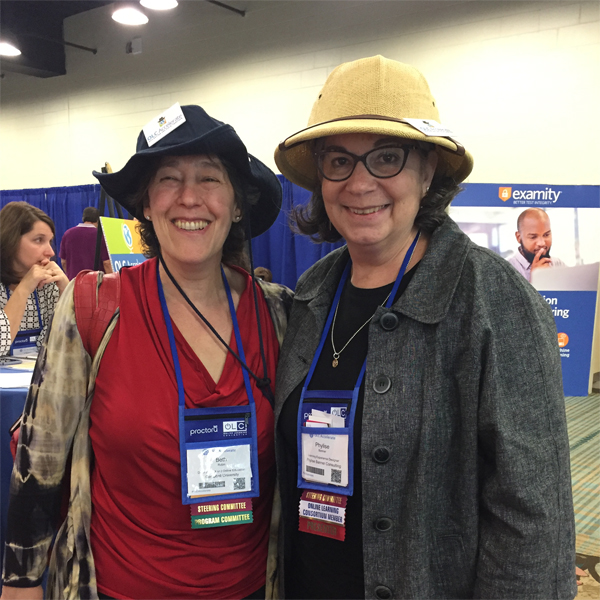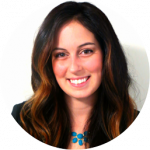 While celebrating the 25th anniversary of our annual international fall conference and the idea of stories being a connecting element throughout all of our conference activities, we are creating a variety of opportunities for you to share your story and to hear the stories of others. We’re calling this initiative #WeAreOLC.
While celebrating the 25th anniversary of our annual international fall conference and the idea of stories being a connecting element throughout all of our conference activities, we are creating a variety of opportunities for you to share your story and to hear the stories of others. We’re calling this initiative #WeAreOLC.
Not too often do teaching and learning conferences provide the opportunity to exchange stories “on the move.” In this piece, the OLC Accelerate Field Guide subcommittee discusses the opportunities to share your story effectively, and how we might learn from others’ experiences. In conclusion, the team will share their favorite stories about feeling good mentally and physically at the OLC Accelerate conference.
As teachers and learners, so much of our lives relies on our ability to be active and creative. Whether it’s inventing new strategies to engage our students or building accessible and open educational resources, each of us expends tons of creative energy each day. The OLC Accelerate Conference in November provides unique experiences to flex creative muscles and exercise our right to physical activity. The OLC Field Guide program is a great opportunity to explore various conference spaces and share your story alongside new friends. Field Guides are volunteers and OLC community members who are passionate about sharing their experiences with OLC conferences. This volunteer program is a great way to combat mental burnout and share your stories on the move.
Tour the Conference Space. A great way to explore the Swan and Dolphin hotel and the layout of the conference. Tours will be led by a Field Guide Volunteer and occur on Tuesday night and Wednesday morning of conference week. Those interested in attending will meet at the designated Field Guide station. You will have the chance to familiarize yourself with our shared space and get moving with other attendees! Previous participants most enjoyed the “insider information” shared by the tour guide, see what they had to say below!
Michael Cole, Educational Accessibility Specialist at Wichita State University:
“I was apprehensive about attending the conference in such a large space, but the Field Guide tours of the Swan and Dolphin really set my mind at ease. It was a great opportunity for me to get to know other new conference goers and understand the layout of the conference. I found myself opening up about my own institution and sharing stories with new friends! The casual walk through the conference space got me comfortable and excited for the next few days! My guide also shared awesome tips with us including where to find some cheap food!”
Host or Participate in a Talk-about. Your opportunity to exchange “big ideas on the move!” These daily escapes are a break from traditional conference sessions. Held during concurrent sessions, a Field Guide volunteer will guide you on a previously organized route around the conference center. During your walk, you’ll share stories and experiences around a themed discussion. Talk-abouts are inclusive to all! We offer short and long routes in an attempt to accommodate as many attendees as possible. Talk-abouts will meet at the Field Guide station before they depart. If you’re interested in hosting a Talkabout, checkout our Field Guide Sign-Up form.
Katrina Wehr, Instructional Designer at Penn State College of Arts & Architecture:
“I used to be a wallflower at conferences. I don’t typically do small talk and I never approach people in public, so participating in the program was a great opportunity to develop my confidence. Specifically, I volunteered to lead a Talk-About session, which is a 45-minute walk-and-talk style conversation around a general topic. Participating in something like this a few years ago would have made me cringe, but walking around the conference center property was a relaxing opportunity to stretch my legs and talk in an informal way with colleagues from many institutions. I had a really insightful conversation with a librarian and another instructional designer about incorporating open resources in courses, where we discussed challenges and opportunities and shared some resources. After the conference, the Talk-About was my favorite session because of the way the format allowed for organic connections to form.”
Visit our many Networking Spaces. Check out the various networking opportunities located around the conference space on a Field Guide tour of the Exhibit Hall, Technology Test Kitchen, and Speed Networking Lounge on Wednesday morning of conference week. During the tour, you’ll get to know the volunteers who run the areas and learn about unique conference experiences! You’ll find yourself returning to these spaces again and again as you meet new friends and colleagues in an exciting, collaborative space.
Torie Wynn, Instructional Designer at the University of Missouri-Kansas City:
“Physical activity has always been a solution I turn to in times of stress. Writing my thesis? Take a walk. Course consultation in ten minutes? Stretch my upper body. Rough day at work? Time for a visit to the gym. My active experiences at OLC Conferences are my favorite to share. When I reflect on OLC conferences, I think about learning from peers in Field Guide Talk-abouts and exploring collaborative spaces like the Technology Test Kitchen with new friends. Walking around OLC conference spaces leaves me feeling more inspired than when I arrived. As the philosopher Friedrich Nietzsche once wrote, ‘All truly great thoughts are conceived by walking’ (Nietzsche). Experiencing the collaborative opportunities like the Field Guides, Technology Test Kitchen, and Speed Networking Lounge help me to get to know my fellow conference goers and professional peers and as friends. There, we have the opportunity to share our stories with one another and set up collaborative opportunities in the future. I walk away from these experiences feeling rejuvanated and refreshed. As I ‘negotiate and position [myself] around physical activity, [I] develop a sense of self that is shaped and embodied by the stories of [my] physical experiences’ (Garrett).”
Utilize an Engagement Map. Grab a map from the Field Guide station or on your OLC Conference App and identify sessions organized by topic area. These maps, created by Field Guide volunteers, highlight sessions that their most looking forward to. These maps will have you explore different session types, scattered across the conference spaces! Feeling overwhelmed? The new Field Guide Power Hour is an hour dedicated to picking out your conference sessions and organizing your schedule. This breakfast event, hosted on Wednesday morning of the conference, will have Field Guide volunteers ready to help you organize your experience.
Laura Widenor, Instructional Designer at Kansas State University Global Campus:
“I often equate going to a conference as if I am going off to overnight camp. I get that nervous excitement, wondering who I will meet and what I’ll get to do. Even as a grownup and an introvert, it’s hard to do things alone. The Field Guides helped me feel not so alone! It was great to walk up to registration to pick up my materials, and then see the Field Guide table with smiling faces and guides to help me sort through the amazing list of sessions. I felt welcome and knew there were good people to go and talk to if I had any questions.”
We hope that you’ll sign up to be a Field Guide at this year’s conference, and we look forward to chatting with you online before we meet at the conference in November in Orlando. In the meantime, what are your favorite stories of movement and creativity from OLC? Share your stories with #WeAreOLC.
HOW CAN YOU CONTRIBUTE?
We know that we would not be where we are today were it not for your contributions over the last 25 years. With this in mind, we first invite you to share your own OLC narratives. You can join in our quest to story the past (so that we can better prepare for the future) by submitting one or more of the following to this GOOGLE FORM:
Share a visual memory
They say a picture is worth a thousand words and we encourage you to help us collect memories from the past. Scour your archives for photos, videos, documents, or other resources that tell a story. We’ll share them with the OLC community through our social media channels as our way of saying “thanks for being a part of the OLC”.(Remember, we’re hoping to build a history of the OLC for the last 25 years)
Share your story
We want to highlight you and your work or contributions to making OLC what it is today. Create a blog post, a twitter post, etc. that we can share with the other members of our community. Here are a few prompts to get you started.
- How did you first get involved with the OLC?
- 25 years (then and now): What kinds of technology were you using 25 years ago and what technology do you engage with now?
- What is one of your favorite OLC experiences?
- Who composes your OLC community (i.e. the people you have met along the way and always enjoy seeing)? Tell a story that shares about your relationship.
- How do you support inclusion, diversity, equity, and advocacy in your teaching and learning and how has this evolved in the past 25 years?
We hope that you join us by following along with the series, as we articulate our shared commitment to a more inclusive, equitable, and humanizing OLC through engaging in individual and collective storytelling. Thank you for sharing your stories with us and for being an important part of our community. #WeAreOLC.
 |
Torie Wynn, Instructional Designer III, UMKC Instructional Design/Technology (OLC Accelerate 2019 Field Guide Chair) |
 |
Megan Kohler, The Pennsylvania State University (OLC Accelerate 2019 Program Co-Chair) |
References
JongHan, Kim. (2015). Physical Activity Benefits Creativity: Squeezing a Ball for Enhancing Creativity. Creativity Research Journal, 27(4), 328-333.
Nietzsche, F. (1889). Twilight of the idols, or how to philosophize with a hammer. Leipzig, Germany: Verlag von C. G. Naumann.
Oppezzo, M., & Schwartz, D. L. (2014). Give your ideas some legs: The positive effect of walking on creative thinking. Journal of Experimental Psychology. Learning, Memory, and Cognition, 40(4), 1142-1152.

